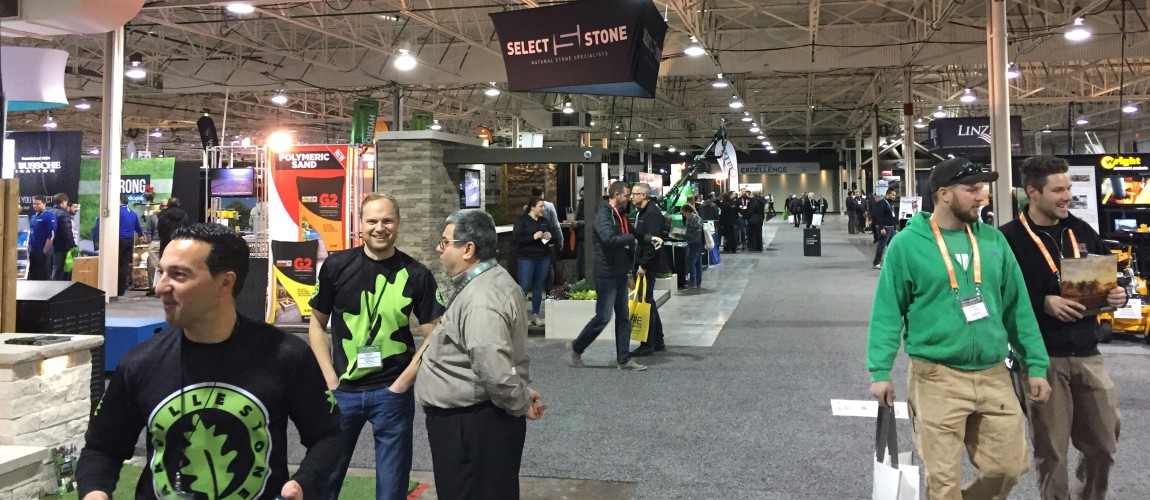Industry Insights
LO Congress 2018

Landscape Ontario Congress 2018 wrapped up last week and as in previous years, Jay offers his take on the Landscape profession’s largest gathering. Check out his Top Ten Takeaways including Charlie Hall's prediction of a banner year for Landscapers and former marketing director for Tim Hortons, Ron Buist's call for respect!
What do you get when you invite thousands of Landscape professionals to a warehouse filled with top of the line equipment, expert exhibitors and world-class speakers?
Answer: Landscape Ontario’s Congress 2018.
We loved having a booth at Congress again this year because it gave us the opportunity to meet with clients both old and new, to talk about the state of the profession and to exchange ideas for how to improve it.
I’m sure many were happy to hear Charlie Hall’s positive economic forecast for 2018. If you didn’t catch it, he’s predicting a banner year this year. Charlie and the other speakers also had many other interesting thoughts.
In no particular order, here are the top 10 things that stood out for me at Congress 2018:
#1. The landscaping profession is now a mature profession.
That means it’s not growing like it used to. It’s fairly easy to make money when an industry is growing at 13% a year but it’s a little harder when that growth slows and then plateaus. In the past, many landscape companies were able to make money almost despite themselves but with slowing growth, many landscape firms will be feeling the squeeze. The ability to grow as a company and maintain or improve margins will require intelligence, innovation, and business acumen. We believe this includes smart investment in effective marketing strategies as well.
#2. Landscapes improve quality of life!
One of the primary strategies in 2018 will be telling a different story about why people should buy landscapes. Landscaping is not only beautiful to look at – it‘s functional and serves our physical, emotional, social, and spiritual health. It’s no longer enough to position our products and services as luxury items or to sell purely on the aesthetics of what we do. New research shows that the improved “Quality of Life” benefits landscapes offer are compelling and relevant selling points.
Animals and plants make us feel good. It’s why, says Charlie Hall, that the pet supply industry saw continuous growth right through the great recession.
In telling their story, landscape professionals should consider talking more about things like:
- Occupancy rates (they go up for professionally landscaped properties)
- Absenteeism (goes down when workplaces include plants)
- Productivity (goes up for the same)
- People will drive farther and pay up to 17% higher prices at stores with professionally landscaped properties.
- Twenty minutes of play in a natural setting every day has the same effect as two pills for a child with ADD. Imagine being able to reduce drug use by playing outdoors in natural SETTING!
- Cognitive activity and engagement increase in natural environments
- Mortality rates improve for people who spend more time connected with nature.
#3. Questions to be asking
A real question for Landscape professionals heading into 2018 is: What QOL issue can you specialize in? What demographic can you have the most impact on by improving their quality of life? Could answering these questions inform a strategic and competitive advantage for you?
#4. Package your brand!
It was fascinating to hear the former marketing director of Tim Hortons, Ron Buist, speak about the lessons they learned during the iconic coffee shop’s early days. Apparently, Ron Joyce, founder of the coffee giant, wasn’t a big fan of advertising or marketing but was passionate about packaging. “Every cup is a billboard” was one of Joyce’s oft-repeated phrases. It’s a similar principle to what we’ve practiced when considering our clients’ trucks, trailers, and uniforms.
#5. Innovate!
Did you know that “Roll up the Rim” was largely the result of a lack of money? Neither did we. When Tim Hortons was struggling financially, Buist’s marketing department was tasked with coming up with a contest to drum up new business. Pull tabs and scratch cards (typically used for contests like this) would have doubled the cost of packaging. After looking a press sheet of the coffee cups, Ron realized it cost no extra to include printing under the rim and the ultra-successful “Roll up the Rim” contest was conceived. But there was another challenge.
#6. Don’t underestimate naming and messaging
Naming and conveying the message of the contest was the bigger challenge for the marketing team at Tim Hortons.
- “Turn up the rim” sounded like a rutabaga.
- “Look under the rim” didn’t explain the method.
- “Roll up and win” wasn’t honest.
- “Roll up the rim to win” was the winner!
Don’t underestimate the importance of clarifying your message. Not sure if your story is clear? We can help.
#7. Respect your customers!
Buist also encouraged us to show respect for customers’ time and intelligence. He spoke out against how marketing and advertising used to degrade women and warned that we are now doing the same to men – portraying them as dim-witted lowlifes. We couldn’t agree more. Let’s lead by example in 2018 and ensure our marketing shows proper respect. Elevate people rather than knock them down.
#8. Shoot Video!
Our prediction that video will continue to be an important medium to tell our stories in 2018 was affirmed by Javed S. Khan.
#9. Pay to play in 2018
Khan also predicted that “pay to play” will continue to be an issue facing digital marketers in social media. Not familiar with the term? Pay to play refers to the way social media channels reward those who buy advertising on those same platforms with better results and ensure that the organic content of paying users gets seen by more people.
#10. Always be recruiting!
Attracting people to the landscape profession is – as always – a major concern. Okay, we didn’t really learn that at the show but we repeatedly heard people talking about it.
What is becoming apparent to landscaping professionals is that recruitment efforts need to target younger people – some even suggested targeting students in grades 7, 8, and 9. It’s another important reason to have a solid, consistent brand identity and engaging presence in the marketplace.

Written by Jason Bouwman, RGD
January 16, 2018


